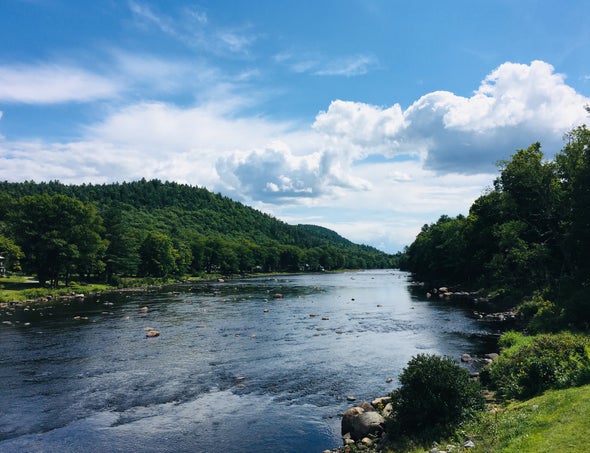(单词翻译:单击)
听力文本
This is Scientific American — 60-Second Science. I'm Jason Goldman.
By now it's almost common knowledge that spending time in nature is good for you. Areas with more trees tend to be less polluted, so spending time there allows you to breathe easier. Spending time outdoors has been linked with reduced blood pressure and stress, and seems to motivate people to exercise more.
"So it'll come as no surprise that there's research showing that spending time in nature is good. I mean, that's been known for millennia. There's dozens of papers showing that."
University of Exeter Medical School researcher Mathew P. White.
"We get this idea, patients are coming to us and they're saying, 'doctor, how long should I spend?' and the doctor is saying, 'I don't really know.'"
So White and his team decided to find out by using data collected from nearly 20,000 people in England through the Monitor of Engagement with the Natural Environment Survey.
And their answer? Two hours a week. People who spent at least that much time amid nature—either all at once or totaled over several shorter visits—were more likely to report good health and psychological well-being than those with no nature exposure.
Remarkably, the researchers found that less than two hours offered no significant benefits. So what's so special about two hours?

"I have absolutely no idea. Really. We didn't have an a priori guess at what this would be, this threshold. It emerged. And I'd be lying if I said we predicted this. I don't know."
Even more noteworthy, the two-hour benchmark applied to men and women, to older and younger folks, to people from different ethnic backgrounds, occupational groups, socioeconomic levels and so on. Even people with long-term illnesses or disabilities benefited from time spent in nature—as long as it was at least 120 minutes per week. The study is in the journal Scientific Reports.
While the findings are based on a tremendous number of people, White cautions that it's really just a correlation. Nobody knows why or how nature has this benefit or even if the findings will stand up to more rigorous investigation.
"I want to be really clear about this. This is very early stages. We're not saying everybody has to do 120. This is really to start the conversation, saying, what would a threshold look like? What research do we need to take this to the next step before doctors can have the true confidence to work with their patients? But it's certainly a starting point."
Thanks for listening for Scientific American — 60-Second Science. I'm Jason Goldman.
参考译文
这里是科学美国人——60秒科学。我是杰森·古德曼。
到目前为止,置身大自然中有益处,这几乎已成为常识。树木较多的地区往往污染较少,因此,在这种地方呆上一段时间可以让你呼吸更顺畅。身处户外可与降低血压和压力联系起来,而且似乎能激励人们多锻炼。
“所以,有研究表明置身大自然有好处就不足为奇了。我的意思是,数千年来人们早已知道这一点。有数十篇文章可以证明。”
埃克塞特大学医学院的研究员马修·怀特说到。
“我们有这个想法是因为,患者会来问我们:‘医生,我应该在大自然中待多长时间?’而医生总是回答:‘我真的不知道’。”
因此,怀特和团队决定利用数据来找出答案,这些数据来自英格兰自然环境参与监测调查的近2万名参与者。
那他们的答案呢?每周两个小时。与那些没有接触自然的人相比,在自然环境中至少待上两个小时的人——无论是一次待够两个小时还是数次合计两个小时——更有可能报告良好的身体和心理健康。
值得注意的是,研究人员发现,少于两个小时没有明显的益处。那两个小时有什么特别之外?
“我完全不知道。真的。我们没有对这个临界值做先验的猜测。这个临界值就这样出现了。如果我说我们预测到了这一点,那我就是在撒谎。我是真的不知道。”
更值得注意的是,两个小时这一基准适用于男性和女性、老年人和年轻人、来自不同种族背景、职业群体、社会经济水平的人等等。即使是患有长期疾病或残疾的人,也能从置身大自然中获益——只要每周至少待120分钟。这项研究发表在《科学报告》期刊上。
虽然这些发现是基于研究大量人群得出的结论,但怀特警告称,这实际一只是一种相关性。没有人知道大自然为何或如何拥有的这种好处,甚至不知道研究结果能否经得起更严格的调查。
“我想把这件事弄清楚。这是非常早期的阶段。我们不是说每个人都必须在大自然中待120分钟。这真正开启了对话,比如‘临界值是怎样的?’我们需要做哪些研究来把这个问题推进到下一步,使医生真正有信心回应患者?但这确实是一个起点。”
谢谢大家收听科学美国人——60秒科学。我是杰森·古德曼。
译文为可可英语翻译,未经授权请勿转载!
重点讲解
重点讲解:
1. all at once 同时;一起;
I can't do everything all at once─you'll have to be patient.
我不能万事一把抓呀。你可急不得。
2. apply to 适用;适合;
The convention does not apply to us.
这条惯例对我们不适用。
3. and so on 及诸如此类;等等;
We discussed everything─when to go, what to see and so on.
我们什么都商量过了——什么时候走、看什么等等。
4. stand up to 经得住;
Is this building going to stand up to the strongest gales?
这座楼能经得住最强劲的大风吗?


